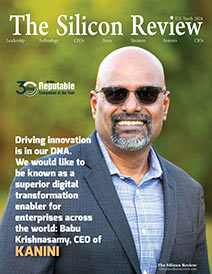50 Fastest Growing Tech Companies 2017
Simplifying big data and AI with a platform from the team that started Apache Spark: Databricks
The Silicon Review
![]() “We always believe that Big Data is a huge opportunity that is still largely untapped, and we’re working to revolutionize what you can do with it.”
“We always believe that Big Data is a huge opportunity that is still largely untapped, and we’re working to revolutionize what you can do with it.”
Today's computing world is witnessing a massive tsunami of technology change moving towards the next generation of computing. Many IT giants have decided to grow with ever-changing technology. And in this entire scenario, Cloud Computing and Big Data are playing the role of a key player.
To be part of the massive tsunami of technology change and with a mission to accelerate innovation by unifying Data Science, Engineering, and Business, the team who created Apache Spark all set to Databricks. Finally, in 2013, out of the UC Berkeley AMPLab Databricks was founded.
A Glimpse of Databricks
Founded by the team who created Apache Spark, Databricks is one of the leading providers of Unified Analytics Platform for data science teams to collaborate with data engineering and lines of business to build data products. Users achieve faster time-to-value with Databricks by creating analytic workflows that go from ETL and interactive exploration to production. The company also makes it easier for its users to focus on their data by providing a fully managed, scalable, and secure cloud infrastructure that reduces operational complexity and total cost of ownership.
Apache Spark is an open source, hosted by the vendor-independent Apache Software Foundation. At Databricks, everyone is fully committed to maintaining the open development model. The company believes that no computing platform will win in the Big Data space unless it is fully open. Spark has one of the largest open source communities in Big Data, with over 1000 contributors from 250+ organizations. Databricks works within the open source community to maintain this momentum.
Spark has one of the largest open source communities in Big Data, with over 1000 contributors from 250+ organizations. Databricks works within the open source community to maintain this momentum.
Harness the Power with the First-Rate Solution by Databricks
Databricks is marking its territory in the industry with every passing year. The company has a fantastic portfolio of products and service. The amazing offerings by Databricks are one of the significant reasons behind company’s ever-increasing popularity.
Unified Analytics Platform
- Microsoft Azure Databricks: It is a fast, easy, and collaborative Apache Spark based analytics platform optimized for Azure designed in collaboration with Microsoft and the creators of Apache Spark. Azure Databricks combines the best of Databricks and Azure to help customers accelerate innovation with one-click setup, streamlined workflows and an interactive workspace that enables collaboration between data scientists, data engineers, and business analysts.
- Databricks on AWS: The Databricks unified analytics platform runs on AWS for cloud infrastructure. It harnesses the power of AI through a truly unified approach to data analytics from the team that created Apache Spark.
Also, it eliminates the need for disjointed tools with an interactive workspace that offers real-time collaboration, one-click visualizations, and built-in data source connectors and integrations with BI tools.
Databricks Runtime
Built on top of Spark and native to the cloud, Databricks Runtime optimizes Spark, making it 10-40x faster and more reliable.
The Databricks I/O module (DBIO) takes processing speeds to the next level — significantly improving the performance of Spark in the cloud. The company’s serverless and highly elastic cloud service is designed to remove operational complexity while ensuring reliability and cost efficiency at scale. Also, the fully-managed cloud platform helps in reaping the benefits of a fully managed service and removes the complexity of big data and machine learning.
Databricks Delta
Databricks Delta is a unified data management system that provides the scale and cost-efficiency of a data lake, the reliability, and performance of a data warehouse, and the low latency of a streaming ingest system. This unified data management system is armed with some of the amazing features that can do things like:
- Manage Continuously Changing Data Reliably
- Enable Fast Queries at Massive Scale
- Provide Cost Efficiency and Scale of Data Lakes
- Natively Integrate With the Unified Analytics Platform
Databricks Collaborative Workspace
Databricks offers an interactive workspace for all stakeholders, so one can build data pipelines, train and productionize machine learning models, and share insights into the business all from the same environment.
Security and Compliance
Databricks Enterprise Security protects data at every level with a unified security model featuring fine-grained controls, data encryption, identity management, rigorous auditing, and support for compliance standards.
Testimonials
“Databricks’ unified platform has helped foster collaboration across our data science and engineering teams which have impacted innovation and productivity.”
-John Landry, Distinguished Technologist at HP, Inc.
“Databricks lets us focus on business problems and makes certain processes very simple. Now it’s a question of how do we bring these benefits to others in the organization who might not be aware of what they can do with this type of platform.”
-Dan Morris, Senior Director of Product Analytics , Viacom
Greet the CEO
Ali Ghodsi is the Co-founder and CEO of Databricks. Ali is responsible for the growth and international expansion of the company. He previously served as the VP of Engineering and Product Management before taking the role of CEO in January 2016. In addition to his work at Databricks, Ali serves as an adjunct professor at UC Berkeley and is on the board at UC Berkeley’s RiseLab. He is was one of the creators of open source project, Apache Spark, and ideas from his academic research in the areas of resource management and scheduling and data caching have been applied to Apache Mesos and Apache Hadoop.
Ali received his MBA from Mid-Sweden University in 2003 and Ph.D. in Distributed Computing from KTH/Royal Institute of Technology, Sweden in 2006.









